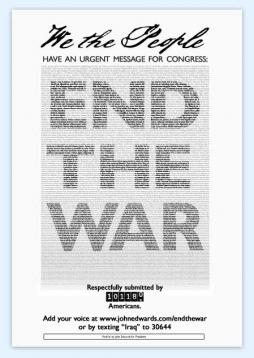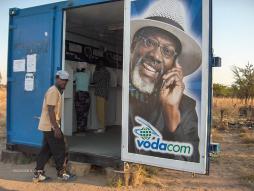Democratic Participation
Posted by KatrinVerclas on Sep 13, 2007
Text messaging works to get out the youth vote. Researchers from Princeton and Michigan Universities, together with the US Student Public Interest Research Group (PIRG) New Voter Project and Working Assets finally released a study of their text message mobilization efforts in the United States elections in November 2006. The fact sheet is here, the full study with the different forms of text reminders and outine of the methodology is attached.
The study found that text message reminders to new voters increased an individual’s likelihood of voting by 4.2 percentage points. This is an increase similar to "quality phone call" reminders but at a fraction of the cost, indicating that partisan and nonpartisan voter mobilization efforts need to urgently get on the mobile bandwagon.
Posted by on Jan 01, 1970
n/a
Posted by on Jan 01, 1970
n/a
Posted by KatrinVerclas on Jun 11, 2007
Protest campaigns in recent weeks in China and Pakistan are pointing to a quickening pace of social activism primarily enabled by mobile phones.
On May 31, 2007, authorities in Xiamen halted construction of a large petro-chemical plant, following a furious Internet, street, and text campaign. The story began on a few local blogs, spread wide on the Internet with sites like antipx.com, and street graffiti.
On March 25, according to news reports in the Asia Sentinel, Sydney Morning Herald and others, a text message began circulating:
Posted by KatrinVerclas on May 16, 2007
In the United States, the political season is heating up and candidates are jumping on the mobile bandwagon. Hillary Clinton, Democratic presidential candidate, announced "Connect with Hillary" whereby supporters can get regular updates from the campaign via cell phone. Meanwhile, another competitor for the Democratic seat, Senator John Edwards, is raising money for an ad campaign in the Washington Post, showing the support he garnered for ending the war in Iraq. The ad is here -- and noteworthy is the short code at the bottom of the ad - text "Iraq" to 30644 to show your support to end the war. (Thanks, TechPresident, for the pointer)
Posted by KatrinVerclas on May 09, 2007
Ethan Zuckerman has written a solid overview of mobile phones in international activism. It is re-posted here under its Creative Commons license. For additional resources, see also the mobileactive.org Strategy Guides on using mobile phones in elections, advoacy, and fundraising.
Posted by on Jan 01, 1970
n/a
Posted by on Jan 01, 1970
n/a
Posted by on Jan 01, 1970
n/a
Posted by on Jan 01, 1970
n/a
Posted by on Jan 01, 1970
n/a
Posted by on Jan 01, 1970
n/a
Posted by on Jan 01, 1970
n/a
Posted by on Jan 01, 1970
n/a
Posted by on Jan 01, 1970
n/a
Posted by on Jan 01, 1970
n/a
Posted by on Jan 01, 1970
n/a
Posted by KatrinVerclas on Apr 10, 2006
SMS messages were in wide use in the recent Thai elections, both officially and inofficially.
In preparation for Thailands snap election last week, Thailand's Election Commission sent text messages to 25 million cell phone customers politely reminding them to vote. The message read: "You are cordially invited to exercise your right to vote on February 6, between 8 am and 3 pm."
At the same time, the Nation, a Thai newspaper, reported recently on a text message campaign among voters urging them to bring a a pen with them to mark their ballots.
The SMS stated: "Don't use the rubber stamp provided [by the authorities] to prevent fakes. Tell all your friends too."
Posted by on Jan 01, 1970
n/a
Posted by KatrinVerclas on Mar 22, 2006

This campaign is powered by Mobile Voter and MobileActive Ben Rigby, supported by the Pew Charitable Trusts.




